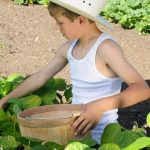The United States Department of Agriculture (USDA) is urging individuals across the country to register their vegetable gardens. This proactive request by the USDA is part of a larger initiative aimed at gathering data on home gardening practices. By collecting information on vegetable gardens, the USDA can better understand and support this vital aspect of agriculture in the United States.
Registering your vegetable garden with the USDA is essential as it allows for comprehensive data collection that can benefit not only individual gardeners but also the broader agricultural community. By voluntarily providing details about your garden, such as the types of crops grown and gardening techniques used, you are contributing to a wealth of knowledge that can inform decision-making processes within the USDA and help improve agricultural practices nationwide.
The act of registering your vegetable garden with the USDA offers numerous advantages. Not only does it enable you to be part of a valuable data collection effort, but it also provides an opportunity for community engagement and collaboration.
Furthermore, registering your garden can have a positive impact on food safety measures by enhancing traceability and accountability within the agricultural system. Overall, participating in this registration process demonstrates a commitment to supporting sustainable agriculture and ensuring the overall health and well-being of our food supply chain.
Background
The USDA’s request for people to register their vegetable gardens stems from a need for comprehensive data collection in order to better understand and monitor the landscape of vegetable production in the United States. By registering their gardens, individuals can contribute valuable information that will aid the USDA in making informed decisions regarding agricultural policies, resource allocation, and research initiatives.
This data will help officials identify trends, assess the impact of various factors on vegetable production, and develop strategies to support sustainable agriculture practices.
There are several reasons why the USDA is asking people to register their vegetable gardens. One key rationale is to create a more accurate picture of where vegetables are being grown across the country.
This information can then be used to identify areas with high-demand for certain types of produce or areas that may benefit from additional support or resources. Additionally, by having a comprehensive database of registered vegetable gardens, the USDA can improve its ability to respond effectively in times of crisis such as disease outbreaks or natural disasters that could threaten food security.
Registering your vegetable garden with the USDA also provides individual gardeners with benefits. By participating in this initiative, gardeners can access resources and support from government agencies, extension services, and other agricultural organizations. They may receive important updates on best practices for pest management, watering schedules, soil health maintenance, and more. Furthermore, registered gardeners may have opportunities to participate in community events, workshops, and educational programs geared towards promoting sustainable gardening practices and increasing local food production.
- Access valuable resources and support
- Participate in local community events
- Stay informed about best practices for gardening
Benefits of Registering
The USDA’s request for people to register their vegetable gardens serves as a crucial step in maintaining food safety and supporting the agricultural community. By registering your vegetable garden with the USDA, you contribute to a comprehensive database that aids in tracking food sources and potential hazards. This data collection process enables quicker responses to food safety issues and helps in ensuring that fresh produce is safe for consumption.
One of the key benefits of registering your vegetable garden with the USDA is that it allows for better traceability of produce in case of contamination or outbreaks. In the event of a foodborne illness linked to certain vegetables, having accurate information about where the produce originated can help pinpoint the source of the issue quickly. This not only protects consumers but also helps farmers identify and address any problems in their growing practices.
Moreover, registering your vegetable garden with the USDA can also provide opportunities for educational outreach and resources. By participating in this initiative, individuals can access valuable information on best practices for growing vegetables, pest management techniques, and sustainable agriculture methods. Ultimately, registering your vegetable garden goes beyond just compliance – it enhances transparency in the food supply chain and promotes overall food safety standards.
| Benefit | Explanation |
|---|---|
| Traceability | Helps pinpoint sources of contamination quickly |
| Educational Resources | Access to best practices for growing vegetables and sustainable agriculture methods |
How to Register
The USDA’s request for people to register their vegetable gardens is an essential step in promoting agricultural awareness and ensuring food safety across the nation. By registering your garden with the USDA, you are contributing valuable data that can help in monitoring and improving agricultural practices. This information allows the USDA to have a better understanding of the nation’s food production landscape, which can ultimately benefit farmers, consumers, and the agricultural industry as a whole.
One of the primary reasons why the USDA is asking individuals to register their vegetable gardens is to establish a comprehensive database of agricultural resources. This database not only helps in tracking food sources but also plays a crucial role in identifying potential threats to crop health and food safety. Additionally, by registering your garden with the USDA, you are actively participating in creating a more transparent and accountable food supply chain.
To register your vegetable garden with the USDA, follow these simple steps:
- Visit the official USDA website or contact your local USDA office.
- Fill out the required registration form with accurate information about your vegetable garden.
- Submit the completed form either online or via mail as instructed.
- Keep a record of your registration confirmation for future reference.
| Advantages of Registering | Benefits |
|---|---|
| Contributes valuable data for monitoring agricultural practices | Helps identify threats to crop health and food safety |
| Promotes transparency in the food supply chain | Supports accountability in agriculture |
Importance of Data Collection
The USDA’s request for people to register their vegetable gardens is a crucial step in collecting valuable data that is essential for the agricultural community. By registering your vegetable garden, you are contributing to a database that provides vital information on the distribution of various crops, gardening practices, and potential pest or disease outbreaks.
This data collection allows the USDA to have a comprehensive understanding of the landscape of vegetable gardening across the country, which can ultimately benefit farmers, researchers, and policymakers.
Understanding Gardening Trends and Practices
One of the key benefits of registering your vegetable garden with the USDA is that it helps in tracking gardening trends and practices. By analyzing the data collected through registrations, the USDA can identify popular vegetables being grown, preferred gardening methods, common challenges faced by gardeners, and successful strategies implemented by individuals. This information can then be used to develop resources, guidelines, and recommendations that aim to support and improve vegetable gardening practices nationwide.
Early Detection of Pest Outbreaks
Another important aspect of data collection through registering vegetable gardens is the early detection of pest outbreaks. By monitoring registered gardens for signs of pests or diseases, the USDA can quickly identify and respond to any potential threats that may impact agricultural production. With this proactive approach to pest management, gardeners can receive timely alerts and guidance on how to address these issues effectively, ultimately safeguarding their crops and preventing widespread infestations in the community.
Impact on Food Safety
Registering your vegetable garden with the USDA can have a significant impact on food safety practices. By providing information about the location, scale, and types of crops grown in your garden, you are contributing vital data that can help identify potential risks and prevent foodborne illnesses. This registration process allows for better traceability in case of contamination outbreaks or other issues that may arise.
Enhanced Monitoring and Response
One of the key ways in which registering your vegetable garden can improve food safety is through enhanced monitoring and response capabilities. With a comprehensive database of registered gardens, the USDA can quickly track down the source of any potential contamination or disease outbreak. This rapid response not only protects consumers but also helps farmers identify and address issues within their own operations to prevent future occurrences.
Quality Control and Best Practices
Another benefit of registering your vegetable garden with the USDA is the opportunity to access resources and guidance on best practices for food safety. Through workshops, webinars, and informational materials, registered gardeners can learn about proper handling, storage, and processing techniques to minimize risks associated with their produce. This valuable knowledge not only improves individual practices but also contributes to raising overall food safety standards across the agricultural community.
Community Involvement
Here are some ways in which community involvement can make a difference in registering vegetable gardens with the USDA:
- Spread awareness: By sharing information about the importance of registering vegetable gardens, community members can encourage others to participate and contribute to the overall success of the initiative.
- Collaborate with local organizations: Working together with local gardening clubs, food banks, or other community groups can help streamline the registration process and reach a wider audience.
- Organize events or workshops: Hosting events or workshops focused on registering vegetable gardens can engage more individuals and provide them with the necessary resources and support to complete the registration.
In addition to these efforts, community involvement can foster a sense of unity and shared responsibility towards promoting sustainable agriculture practices. As more people come together to register their vegetable gardens with the USDA, they are not only helping collect valuable data but also creating a network of support that benefits everyone involved. So let’s join hands and work towards a thriving agricultural community by registering our vegetable gardens today.
Conclusion
In conclusion, the USDA’s request for people to register their vegetable gardens is not merely a bureaucratic formality but a crucial step in ensuring the resilience and safety of our food supply. By registering your garden, you are contributing valuable data that can help the agricultural community make informed decisions and better respond to challenges such as pests, diseases, and market demands. This information is vital for planning and providing support where it is needed the most.
Moreover, registering your vegetable garden with the USDA offers numerous benefits. It allows for better traceability of produce, which can enhance food safety measures and help in quickly identifying and containing any potential outbreaks or contamination issues. Additionally, access to aggregated data from registered gardens can aid in research efforts, leading to improved agricultural practices and innovations that benefit both producers and consumers alike.
As responsible stewards of our food system, it is imperative that we heed USDA’s call to register our vegetable gardens. By doing so, we are not only safeguarding our own interests but also actively participating in a collective effort to strengthen the agricultural landscape. Let us embrace this opportunity to contribute to a more resilient and sustainable future for our food supply chain.

If you’re looking to get into vegetable gardening, or are just looking for some tips on how to make your current garden better, then you’ve come to the right place! My name is Ethel and I have been gardening for years. In this blog, I’m going to share with you some of my best tips on how to create a successful vegetable garden.





